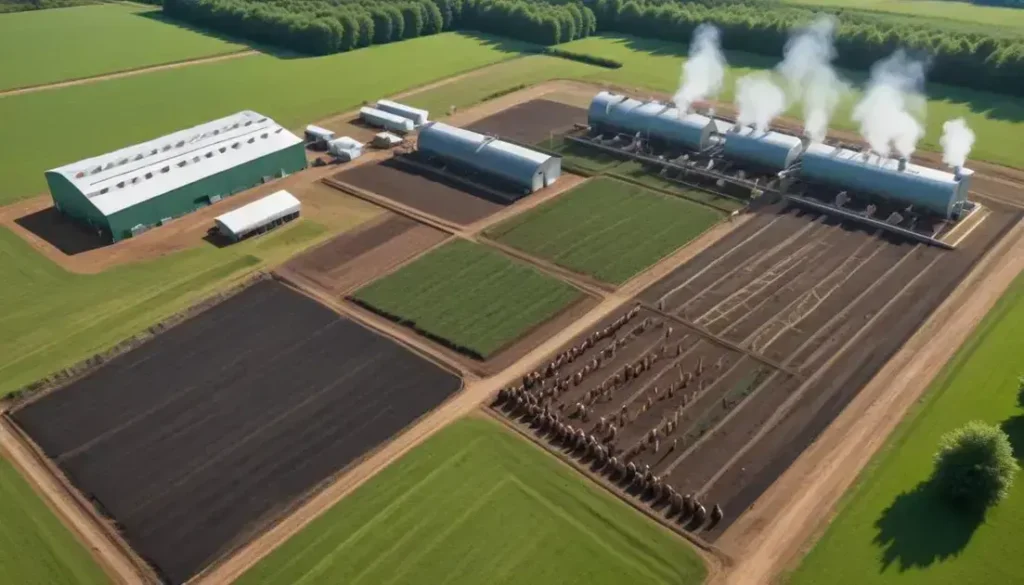Bunge is committed to sustainability in agriculture by implementing regenerative farming practices, ensuring supply chain transparency, and supporting Australian farmers through education and fair trade initiatives.
In the world of **agriculture**, Bunge is stepping up to address sustainability challenges head-on. What does this mean for farmers and the environment?
Introduction to Bunge’s sustainability efforts
Bunge has committed to sustainability, focusing on environmental responsibility and social impact across its operations. By implementing progressive practices, they aim to reshape the agricultural landscape. One of the key initiatives involves reducing greenhouse gas emissions, which aligns with global climate goals. Through technology and innovative farming methods, Bunge seeks to optimise resource use, ensuring a more efficient production system.
A significant component of Bunge’s strategy is collaborative partnerships with farmers and stakeholders. This engagement fosters a shared commitment to sustainable practices and enhances transparency in the supply chain. By empowering farmers with knowledge and tools, Bunge aims to promote regenerative agriculture, which enriches soil health and boosts biodiversity.
Moreover, Bunge recognises the importance of aligning their operations with local communities. By investing in community development initiatives, they support local economies and address societal needs. Such efforts not only benefit the environment but also enhance the livelihoods of those involved in agriculture.
Emissions reduction achievements
Emissions reduction has become a pivotal goal for global industries, and Bunge is at the forefront, implementing innovative strategies to tackle this challenge. By integrating advanced technologies and sustainable practices, Bunge aims to minimise its carbon footprint across all operations. This approach not only enhances environmental sustainability but also contributes to better business efficiency.
One of the standout achievements in Bunge’s emissions reduction journey is the investment in renewable energy sources. By transitioning to wind and solar energy, they significantly lower greenhouse gas emissions while sustaining production levels. Additionally, Bunge’s commitment to improving energy efficiency in their facilities plays a crucial role in decreasing overall emissions.
Bunge also collaborates with farmers to implement practices that reduce emissions at the source. By advocating for precision agriculture, they help farmers optimise resource use, leading to reduced fertiliser and pesticide application, which in turn diminishes emissions related to agriculture. Furthermore, the development of sustainable supply chains enhances transparency and reduces emissions associated with logistics.
Regenerative agriculture initiatives
Regenerative agriculture is transforming the way Bunge interacts with farmers and the environment. This holistic approach focuses on restoring soil health, enhancing biodiversity, and increasing ecosystem resilience. By prioritising practices that regenerate natural resources, Bunge aims to create a sustainable agricultural model that benefits both farmers and the planet.
A key initiative involves providing education and resources to farmers about regenerative techniques. This includes no-till farming, crop rotation, and cover cropping, which not only improve soil quality but also increase carbon sequestration. These practices effectively reduce greenhouse gas emissions and enhance the resilience of crops against climate-related challenges.
Moreover, Bunge actively collaborates with local agricultural organisations to promote innovation and research in regenerative methods. This collaboration ensures that farmers have access to the latest findings and technologies that support sustainable farming. By doing so, Bunge not only aids in sustainable production but also enhances farmers’ economic viability through improved yields and lower input costs.
Through dedication to regeneration, Bunge is setting a precedent for the agricultural sector, showing how businesses can actively contribute to environmental health while supporting the livelihoods of farmers.
Supply chain traceability and transparency
Supply chain traceability is crucial for ensuring sustainability in agriculture, and Bunge prioritises transparency throughout its operations. By implementing advanced tracking systems, Bunge can monitor each step in the supply chain, from farm to consumer. This level of oversight is essential for reinforcing trust with farmers and consumers alike.
One of the key advantages of enhanced traceability is the ability to quickly identify and address any potential issues in the supply chain. In cases of contamination or quality concerns, Bunge can pinpoint the source and take necessary actions, ensuring that safety standards are met. This not only protects consumers but also strengthens the reputation of their suppliers.
Bunge’s commitment to technological innovation allows for real-time data sharing with stakeholders. Farmers, suppliers, and consumers gain insights into the journey of products, which fosters a sense of community and accountability. This transparency contributes to a sustainable business model by encouraging responsible practices among all parties involved.
By prioritising supply chain traceability and transparency, Bunge sets a benchmark for the industry. Their efforts not only support environmental sustainability but also promote ethical sourcing, benefiting both the planet and agricultural communities.
Collaborations for sustainable standards
Collaborations for sustainable standards are crucial for fostering a unified approach to environmental responsibility within the agricultural sector. Bunge actively engages with a diverse range of stakeholders, including farmers, NGOs, and industry players, to develop and promote sustainable practices. This collaborative effort aims to set universally accepted standards that enhance agricultural sustainability globally.
One significant aspect of Bunge’s collaboration strategy is participation in industry initiatives that focus on sustainability benchmarks. By aligning with others in the industry, Bunge works to establish regulations that not only protect the environment but also ensure economic viability for farmers. This helps build a framework where sustainable practices can thrive.
Through partnerships with NGOs, Bunge gains invaluable insights into best practices for environmental stewardship. These collaborations encourage knowledge sharing and the development of effective strategies tailored to local needs. As a result, farmers can adopt practices that lead to improved resource management and greater resilience against climate change.
Bunge’s commitment to forming alliances exemplifies how shared goals can lead to significant advancements in sustainability. By continuing to collaborate and innovate, they pave the way for a more sustainable agricultural future.
Impact on Australian farmers
The impact on Australian farmers is significant as Bunge implements sustainable practices across the agricultural sector. As one of the key players in the industry, Bunge’s initiatives are designed to benefit farmers directly, enhancing their productivity and profitability. By integrating cutting-edge technology and sustainable methods, the company helps farmers optimise resource usage, which is essential in a challenging climate.
Bunge focuses on educating farmers about best practices in sustainable farming. This includes training on soil health management, efficient water use, and crop rotation techniques. These methods not only improve yields but also contribute to the long-term viability of farming in Australia.
Moreover, Bunge’s commitment to fair trade policies ensures that Australian farmers receive equitable prices for their products. This approach supports local economies and fosters community growth. Farmers can invest back into their businesses, leading to improved equipment and farming techniques.
By supporting sustainability and ensuring fair market access, Bunge plays a vital role in securing the future of Australian agriculture. Farmers are better equipped to face the challenges posed by climate change and changing market demands, creating a resilient agricultural community.
Future outlook for Bunge and agriculture
The future outlook for Bunge and the agriculture sector appears promising, especially as global demands for sustainable practices increase. Bunge is at the forefront of innovation, leveraging technology to enhance agricultural productivity while prioritising environmental stewardship. This balance is essential in meeting the growing need for food security amidst climate challenges.
Investments in research and development will play a critical role in shaping Bunge’s future. By exploring new agricultural technologies and sustainable farming methods, Bunge aims to remain competitive and responsive to market trends. This proactive approach will not only benefit Bunge but also empower farmers to improve their practices and yields.
Furthermore, Bunge’s commitment to collaboration with various stakeholders, including farmers, research institutions, and awareness advocates, underscores its dedication to building a resilient agricultural ecosystem. These partnerships are vital for creating standards that promote sustainable agriculture, which is increasingly important for consumers.
Environmental policies and consumer preferences are shifting towards sustainability, driving Bunge to adapt rapidly. With a strong foundation in ethical practices and community engagement, Bunge is well-positioned to navigate the dynamic landscape of agriculture and contribute positively to the global food system.
In conclusion, the future of agriculture with Bunge looks bright
Bunge’s commitment to sustainability and innovation is paving the way for positive changes in farming practices. By focusing on regenerative agriculture, supply chain transparency, and collaboration with farmers, Bunge is not only improving its own processes but also benefiting the entire agricultural community.
Their efforts to embrace new technologies and sustainable techniques will help address the growing demands of food security while protecting the environment. As we look ahead, it is clear that Bunge is positioning itself as a leader in creating a resilient and sustainable agricultural system.
Ultimately, the collaboration between stakeholders, the use of advanced practices, and a focus on ethical standards will lead to a thriving future for both Bunge and Australian farmers. This collaboration is vital for creating a better agricultural landscape for generations to come.
Common Questions About Bunge and Agriculture
What are Bunge’s main sustainability initiatives?
Bunge focuses on regenerative agriculture, supply chain transparency, and collaborative partnerships with farmers to promote sustainable practices.
How does Bunge support Australian farmers?
Bunge provides education on sustainable farming practices, fair trade pricing, and access to advanced technologies to enhance productivity.
What role does technology play in Bunge’s approach?
Technology is used to optimise farming practices, improve resource management, and enhance supply chain traceability for better efficiency.
How does Bunge ensure transparency in its supply chain?
Bunge implements advanced tracking systems that allow for real-time monitoring and reporting of products from farm to consumer.
Why is collaboration important for Bunge and agriculture?
Collaboration with various stakeholders helps create shared sustainability standards, ensuring that all parties benefit and contribute to a resilient agricultural ecosystem.
What is the future outlook for Bunge in the agriculture sector?
The future looks promising as Bunge continues to innovate and adapt to changing market demands, focusing on sustainability and community engagement.


